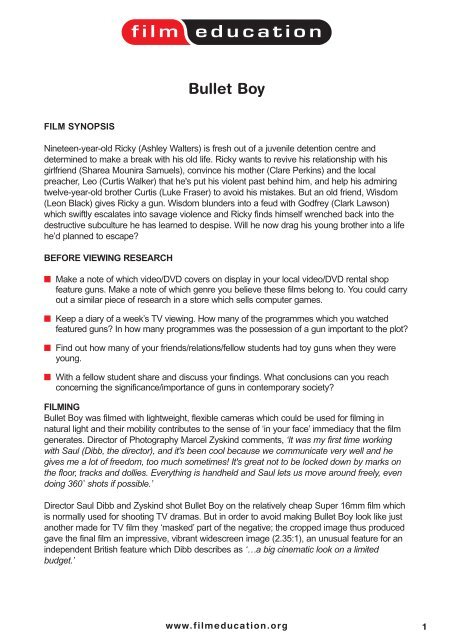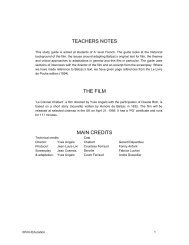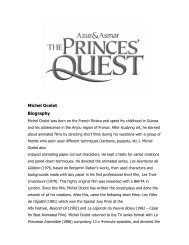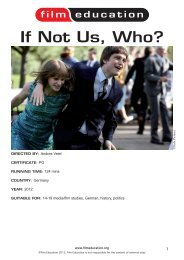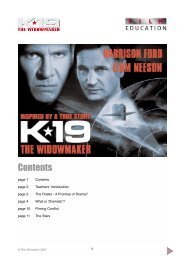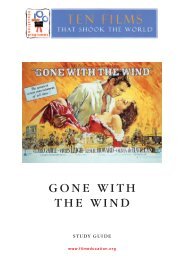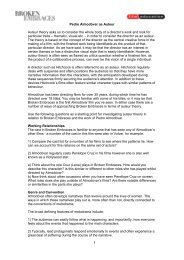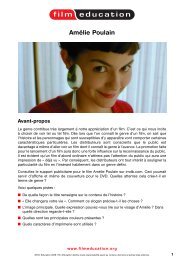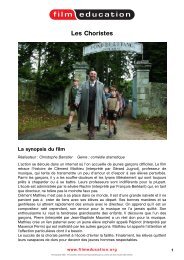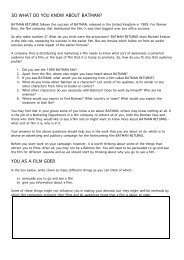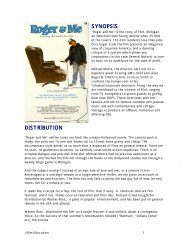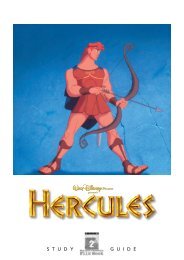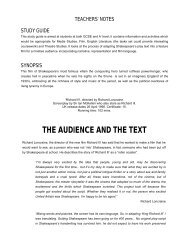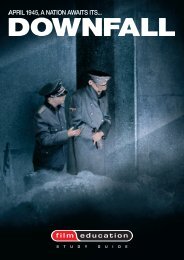Bullet Boy - Film Education
Bullet Boy - Film Education
Bullet Boy - Film Education
You also want an ePaper? Increase the reach of your titles
YUMPU automatically turns print PDFs into web optimized ePapers that Google loves.
FILM SYNOPSIS<br />
<strong>Bullet</strong> <strong>Boy</strong><br />
Nineteen-year-old Ricky (Ashley Walters) is fresh out of a juvenile detention centre and<br />
determined to make a break with his old life. Ricky wants to revive his relationship with his<br />
girlfriend (Sharea Mounira Samuels), convince his mother (Clare Perkins) and the local<br />
preacher, Leo (Curtis Walker) that he's put his violent past behind him, and help his admiring<br />
twelve-year-old brother Curtis (Luke Fraser) to avoid his mistakes. But an old friend, Wisdom<br />
(Leon Black) gives Ricky a gun. Wisdom blunders into a feud with Godfrey (Clark Lawson)<br />
which swiftly escalates into savage violence and Ricky finds himself wrenched back into the<br />
destructive subculture he has learned to despise. Will he now drag his young brother into a life<br />
he’d planned to escape?<br />
BEFORE VIEWING RESEARCH<br />
■ Make a note of which video/DVD covers on display in your local video/DVD rental shop<br />
feature guns. Make a note of which genre you believe these films belong to. You could carry<br />
out a similar piece of research in a store which sells computer games.<br />
■ Keep a diary of a week’s TV viewing. How many of the programmes which you watched<br />
featured guns? In how many programmes was the possession of a gun important to the plot?<br />
■ Find out how many of your friends/relations/fellow students had toy guns when they were<br />
young.<br />
■ With a fellow student share and discuss your findings. What conclusions can you reach<br />
concerning the significance/importance of guns in contemporary society?<br />
FILMING<br />
<strong>Bullet</strong> <strong>Boy</strong> was filmed with lightweight, flexible cameras which could be used for filming in<br />
natural light and their mobility contributes to the sense of ‘in your face’ immediacy that the film<br />
generates. Director of Photography Marcel Zyskind comments, ‘It was my first time working<br />
with Saul (Dibb, the director), and it's been cool because we communicate very well and he<br />
gives me a lot of freedom, too much sometimes! It's great not to be locked down by marks on<br />
the floor, tracks and dollies. Everything is handheld and Saul lets us move around freely, even<br />
doing 360˚ shots if possible.’<br />
Director Saul Dibb and Zyskind shot <strong>Bullet</strong> <strong>Boy</strong> on the relatively cheap Super 16mm film which<br />
is normally used for shooting TV dramas. But in order to avoid making <strong>Bullet</strong> <strong>Boy</strong> look like just<br />
another made for TV film they ‘masked’ part of the negative; the cropped image thus produced<br />
gave the final film an impressive, vibrant widescreen image (2.35:1), an unusual feature for an<br />
independent British feature which Dibb describes as ‘…a big cinematic look on a limited<br />
budget.’<br />
www.filmeducation.org 1
LOCATION<br />
Both writer and director Saul Dibb and Zyskind were keen to avoid offering the audience a<br />
stereotypical view of working-class city life. The events of <strong>Bullet</strong> <strong>Boy</strong> takes place in the Borough<br />
of Hackney, which is often seen as a particularly ‘disadvantaged’ part of London. It would be<br />
easy to present this area of North East London as a grim ‘urban jungle’, especially since this<br />
part of London is sometimes referred to as ‘Murder Mile’, because of the high incidence of fatal<br />
attacks (often gun-related) which occur there.<br />
Many of the locations are in a small area of only a few square miles but <strong>Bullet</strong> <strong>Boy</strong> breaks out<br />
of the claustrophobic world of dingy clubs and tenement flats by frequently intercutting shots of<br />
green fields and empty football pitches – why is nobody playing football on these pitches?<br />
Marcel Zyskind comments that, ‘We also used fantastic open spaces. You have these big<br />
looming pylons and it's quite a contrast between the high rises and the streets and the big open<br />
fields. By the marshes and by the river it's quite picturesque, I think it will stand out like wow, is<br />
this really London?’<br />
TASK<br />
■ Note down which sequences in <strong>Bullet</strong> <strong>Boy</strong> subvert the idea of the stereotypical ‘urban jungle’<br />
film.<br />
DISTRIBUTION AND MARKETING<br />
In the past, films which dealt with ‘black issues’ (as distinct from Hollywood films which feature<br />
black stars such as Wesley Snipes, Halle Berry and Will Smith) would often have a very limited<br />
release. UK film exhibitors would mainly distribute specifically ‘black-themed’ films to<br />
multiplexes in big cities with a significant black population, or to arthouse cinemas.<br />
But Verve Pictures, who handled the release of <strong>Bullet</strong> <strong>Boy</strong>, recognised that the film had wider<br />
appeal. Its unique selling point was that the cast included Ashley Walters - whose own life in<br />
many ways mirrored that of the film’s main character. With the help of lottery money from the<br />
UK <strong>Film</strong> Council’s Printing and Advertising fund, Verve were able to give <strong>Bullet</strong> <strong>Boy</strong> a much<br />
wider distribution.<br />
Verve’s strategy paid off. Within the first six months of its release, <strong>Bullet</strong> <strong>Boy</strong> had grossed<br />
£450,000, a substantial sum for a low-budget UK film, at the UK box office. Most of this money<br />
had been made at carefully selected urban multiplex cinemas rather than the arthouse cinemas<br />
<strong>Bullet</strong> <strong>Boy</strong> had originally been destined for.<br />
www.filmeducation.org 2
TASK<br />
■ Because it is one of the most obviously dramatic sequences in the film all the trailers for<br />
<strong>Bullet</strong> <strong>Boy</strong> begin with the police raid on Ricky’s family’s flat. Which other sequence(s) from<br />
the film would be suitable to begin a trailer for <strong>Bullet</strong> <strong>Boy</strong>?<br />
One of the trailers for <strong>Bullet</strong> <strong>Boy</strong> begins with the alarming tagline ‘There are thousands of guns<br />
in our streets…This is the story of one’. Although in the background of the poster for the film we<br />
can see Curtis and Rio with a gun, the dominant image is Ashley Walters’ head rather than a<br />
gun-toting ‘gangsta’ and the tag line ‘You only get one shot at life’. Design an alternative poster,<br />
with a tagline, for the film which features neither Walters nor a gun.<br />
THE SO SOLID FACTOR<br />
The film’s success was due in no small part to the presence of Ashley Walters starring in his<br />
first feature film. Although Ashley Walters has an established background in TV drama he is<br />
better known to the film’s main target audience as Asher D, a member of So Solid Crew, the<br />
20-plus collective of London DJs, MCs and producers, who enjoyed UK chart success with<br />
garage and hip hop anthems such as ‘Oh No (Sentimental Things)’ (1999) and ‘21’ Seconds<br />
(2001).<br />
TRIVIA<br />
Walters recently won a debate at the prestigious Cambridge University, arguing that rap was<br />
better than philosophy.<br />
www.filmeducation.org 3
TASK<br />
■ Discuss with a partner who you think the film’s main target audience is. Support your answer<br />
with evidence from what you know about the marketing of the film, Ashley Walters and the<br />
film’s content and themes.<br />
So Solid Crew has gained media notoriety because of their involvement in violent crime. Carl<br />
Morgan, a producer with So Solid Crew, was sentenced to thirty years in prison after being<br />
found guilty of murdering his love rival. At the trial, Judge Brian Barker told Morgan, ‘Gun use is<br />
the scourge of our streets and causes misery and distress.’ Dwayne Vincent (Megaman of So<br />
Solid Crew) is facing a retrial on charges connected with the murder and other members of So<br />
Solid Crew have been involved in violent incidents.<br />
Walters was serving an eighteen-month prison sentence for carrying a loaded shotgun when<br />
he read the script for <strong>Bullet</strong> <strong>Boy</strong> and so brings an added ‘authenticity’ to <strong>Bullet</strong> <strong>Boy</strong> which has<br />
not harmed the success of the film. Walters has been candid in interviews about his violent<br />
past: ‘A lot of people will say that going to prison was the worst thing that could have happened<br />
but I needed to be taken out of that equation…Who knows what would have happened? What<br />
if I’d used my gun? What if someone had used it on me?’<br />
Walters emphasises that he is not ‘Ricky’: ‘Playing Ricky was a big challenge though people<br />
don’t believe it. A lot of people are like you’re just playing yourself, innit?...Obviously I was in<br />
prison and came out with the same attitude in not wanting to lead that life anymore.’<br />
However, he inevitably makes some connections between his own life and Ricky’s: ‘Ricky is a<br />
lot like myself…I could relate to him because obviously I've been to jail…and I've grown up in a<br />
similar environment, so I brought a lot of me into the part...I think prison helped me a lot doing<br />
this role because I was able to understand the thoughts that go through your head when you<br />
come out.’<br />
But although in interviews he has hinted at an autobiographical element to the film, Walters’<br />
performance is admirably responsible and restrained. Walters comments that, ‘While you're in<br />
jail, you'd wish that the world would stop and wait for you to come out, but obviously it doesn't.<br />
So when you come out, it's very bewildering, it's overwhelming and I think it's hard to capture<br />
that feeling unless you've experienced it yourself.’<br />
Walters has not brought any ‘showbiz’ glamour or ‘bling’ to a film which takes pains to avoid the<br />
clichés of American ‘gangsta’ movies with their resolutely downbeat ‘no way out of the ghetto’<br />
messages. He is aware of his responsibilities as a role model and keen for his fans in the<br />
audience to heed the film’s message: ‘I’ve got to the point where I know I can’t go back to<br />
prison so I can’t pick up a gun again…I don’t fear no one no more. Personally what I feel I’m<br />
doing is something positive not only for me but for a lot of black kids out there to aspire to<br />
something like this.’<br />
www.filmeducation.org 4
TASK<br />
■ What are the advantages and disadvantages of encouraging an audience to believe that an<br />
actor is playing himself on screen?<br />
REALISM AND AUTHENTICITY<br />
Much of the success of <strong>Bullet</strong> <strong>Boy</strong> depends on its convincing an audience that its plot, location<br />
and characters are ‘realistic’ in a way in which they are not in films such as ‘Spiderman’, ‘Lord<br />
of The Rings’ or a James Bond movie. Yet these films create their own ‘reality’ for an audience<br />
which will be disconcerted or puzzled if the accepted ‘rules’, frequently generic conventions, are<br />
subverted in some fashion.<br />
For example, we accept that Spiderman’s ability to climb up walls derives from the fact that he<br />
was bitten by a genetically modified spider rather than from the magic slippers he was given by<br />
the goddess Athena. Similarly, Gandalf does not defeat Sauron through his easy access to<br />
nuclear weapons or to the years he spent studying at the feet of an ancient Buddhist martial<br />
arts expert. And James Bond’s unerring ability to seduce women and thwart attempts to<br />
dominate the world are in no way due to the magic ring he was given by his fairy godmother.<br />
Such films are worlds away from a ‘realistic’ TV series such as EastEnders which is firmly<br />
located in a world from which magic and androids from the future have been banished.<br />
However, long lost relations reappear, the believed-to-be-dead return to the series and nobody<br />
ever switches on the television to find that Coronation Street or, even less probable,<br />
EastEnders is on!<br />
Saul Dibb was anxious to ensure that his film should be as ‘realistic’ as possible. He has a<br />
background in documentary filmmaking so is used to doing research. He visited the Dalston<br />
Youth Project in Hackney and discussed his project with the teenagers there. ‘I tried to<br />
persuade people to talk to me, openly, which obviously was a difficult thing to do given the fact<br />
that some of them were involved in the whole gun thing,’ he says. ‘It was amazing to discover<br />
how their lives were in some ways very naïve, very innocent, at the same time they’d seen<br />
terrible things happen to them or their families.’<br />
Local residents were recruited as actors to give a sense of authenticity, in terms of how they<br />
look, act (i.e. move) and most importantly, how they speak. Slang and patois, e.g. ‘Stupidness,<br />
innit, bredren, sometink’, are spoken throughout the film to emphasise authenticity/credibility of<br />
the dialogue, even at the risk of offering the ‘outsider’ a slightly stereotyped view of ‘black youth’.<br />
Author Catherine Johnson worked with Dibb on the script. Johnson, then writer-in-residence at<br />
Holloway Women’s Prison, has lived in and around Hackney for most of her life. ‘Working with<br />
Catherine was great, she’s very good with kids and doesn’t find it difficult to see the world from<br />
a kid’s perspective,’ says Dibb.<br />
www.filmeducation.org 5
As a mother with two children and a writer of teenage fiction, Johnson decided to focus more<br />
on Ricky’s relationship with his family: ‘What I thought I could bring to the story was a down-toearth<br />
quality,’ says Johnson. ‘I wanted it to be about kids, not about gangsters. These are just<br />
ordinary kids, who have fewer choices than a lot of other kids their age.’<br />
NOT JUST ANOTHER ‘GANGSTA’ MOVIE<br />
‘<strong>Bullet</strong> <strong>Boy</strong> felt like a story that had been waiting to be told,’ says Saul Dibb. ‘There have been<br />
situations like this, involving kids with guns for about the last ten years in London. But nobody<br />
has tried to tell it from a human point of view, to get inside a family and try to show that there’s<br />
more involved than what you read in the newspaper headlines.’<br />
The film avoids ‘easy’/stereotypical/predictable/clichéd targets. We see no explicit examples of<br />
racist behaviour: there are no National Front skinheads or prejudiced employers; there’s no<br />
background of crime or drug-dealing. Aside from Curtis and Rio’s truancy and dope-smoking,<br />
the only crimes we see are those committed by young black men intent on upholding their<br />
reputations.<br />
<strong>Bullet</strong> <strong>Boy</strong> has been accused of being predictable, partly because it touches on many of the<br />
usual ‘causes’ for the problems that assail Ricky’s family. However, it engages an audience<br />
through its well-defined main characters who never drift into easy stereotypes. Each character<br />
is given a sense of their own individuality and the film contains much good-natured humour and<br />
a sense of the camaraderie that exists between people trying to improve their lives, even while<br />
violent events conspire to destroy them. Because we care about what happens to the<br />
characters and because the film never offers any simple solutions we find its anti-gun message<br />
credible and persuasive without ever being condescending.<br />
TASK<br />
■ Select three key sequences or pieces of dialogue from the film which you believe make<br />
clear the film’s message. For example, Ricky’s mother angrily tells Ricky ‘You might as well<br />
have put the bloody thing in his hand!’<br />
<strong>Bullet</strong> <strong>Boy</strong> offers an alternative to the glamourisation of violence which is regularly used merely<br />
as a means to sell CDs, films and fashionable clothing. Designer labels, expensive trainers,<br />
women in shorts, jewellery and general ‘bling’ are quite absent from Ricky’s world. Whilst for<br />
much of the film we view the action from Ricky’s point of view we are never encouraged to find<br />
what happens engaging, glamourous or exciting. The film’s one sex scene is perfunctory and –<br />
considering that Ricky has just been released from prison – rather unsatisfactory.<br />
Ricky’s girlfriend, Shea, is not presented as a fantasy, glamourous, piece of ‘eye candy’.<br />
Sharea Mounira Samuels (who plays Shea) says that ‘I liked playing Shea because she<br />
reminded me of myself. We come from the same type of areas and I could see why she's<br />
drawn to Ricky. But at the same time she's quite strong-minded.’ Shea is as confused as Ricky<br />
www.filmeducation.org 6
ut is able to accept that, rather than blame the place or the situation, she must take<br />
responsibility for her own actions. Her break with Ricky may seem like a betrayal but it is the<br />
only intelligent course to follow if the alternative is loyalty to a man/boy unable to break with his<br />
old (childhood?) allegiances.<br />
The violent feud which concludes with Ricky’s murder starts over a trivial incident and escalates<br />
mainly because of character defects rather than because of inexorable external forces - such<br />
as racism or social repression. It’s only about halfway through the film that we learn why Ricky<br />
was imprisoned and how he believes his one violent action has damned him in the community:<br />
‘If I stay round people will just drag me back down’ because they will always know who he is:<br />
“There’s Ricky the boy who stabbed up that youth’ - You know how I am – that ain’t me,’” he<br />
tells Shea. Rather than boast about his crime, Ricky is desperate to distance himself from this<br />
violent action:<br />
TASK<br />
■ Draw up a point-by-point chart which shows how Winston’s argument with the van driver<br />
leads to Ricky’s murder. Make clear the connections between each event and alternative<br />
actions which would have ‘defused’ the situation. For example, after he’d broken the wing<br />
mirror, Winston could simply have apologised and offered to pay for the damage.<br />
TASK<br />
■ When Ricky visits Godfrey and tries to distance himself from the shooting of the dog<br />
Godfrey refuses to be placated and refers to the dog as his ‘bredren’. Does this affect the<br />
way we think about Godfrey as a character? Why do you think the image of the dead dog is<br />
repeated throughout the film?<br />
TASK<br />
■ Look again at the sequence after Ricky is taken away by the armed police. We see him<br />
being interviewed but we only hear Ricky’s dialogue. Why do you think the audience are not<br />
allowed to hear what the police, solicitors, social workers etc. have to say?<br />
TASK<br />
■ Consider the connotations of the word ‘bullet’. For example, ‘Faster than a speeding bullet’<br />
was the phrase used to describe the all-powerful Superman. The title <strong>Bullet</strong> <strong>Boy</strong> could refer<br />
to several of the characters in the film. Discuss with a partner which character most merits<br />
the title <strong>Bullet</strong> <strong>Boy</strong>.<br />
www.filmeducation.org 7
MAN AND BOY<br />
Dibb wanted to tell the story of <strong>Bullet</strong> <strong>Boy</strong> from the children’s point of view, especially that of the<br />
twelve-year-old: ‘What I wanted was an innocent’s point of view on an adult world,’ says Dibb.<br />
‘It seemed like being twelve was a kind of critical time for boys when they think they’re turning<br />
into men. So you’ve got a twelve-year-old boy who’s not even a teenager yet he’s still gonna<br />
have to start behaving like he’s a man, or he’s gonna get picked on, he’s gonna get pushed<br />
around. Then you’ve got a nineteen-year-old as well who from a distance looks like a man but<br />
at the same time he’s still struggling with those issues internally.’<br />
Both the ‘powerless’ Ricky and Curtis are being propelled by forces, seemingly outside their<br />
control, towards maturity. Both characters lack a genuine mentor figure, a wise father-substitute<br />
who can offer them guidance as they hurtle towards adulthood. No reference is made to the<br />
absent father – Ricky has to act as both older brother and father figure to Curtis. Leo offers<br />
himself as a mentor to Ricky but his advice – ‘It’s a never-ending circle; just goes round and<br />
round…it don’t lead nowhere’ - is dismissed as ‘preaching’ or ‘stupidness’ and the film remains<br />
ambiguous about the efficacy of religion to offer worthwhile support for someone like Ricky.<br />
TASK<br />
■ The part played by religion in Ricky’s community is important but the film never seeks to<br />
offer Christianity as a straightforward alternative to the world Ricky is dragged back to. Even<br />
the relationship between Ricky’s mother and Leo is kept deliberately ambiguous. Look again<br />
at the film’s final sequence. The church service is intercut with Ricky’s arrival at the station<br />
and his murder, whilst the soundtrack is dominated by the hymn ‘Amazing Grace’. Why do<br />
you think the director chose to connect the two sequences in this way?<br />
The nearest thing that Ricky has to a mentor is the ironically-named Wisdom. Leon Black (who<br />
plays Wisdom) says that ‘I know loads of people like Wisdom so I just have to switch onto<br />
what's going on in his head…I think Wisdom's got a volatile personality because he ain't got no<br />
friends, Ricky's his only bredren, and when Ricky's been inside, Wisdom's just been on his<br />
own, hustling. Also he's grown up without his parents around, so he's got no guidance.’<br />
TASK<br />
■ As a young man, Ricky seems woefully ill-prepared to enter the world of adults: no job, still<br />
sharing a room with his little brother. Curtis has access to his big brother’s ‘girly mags’, plays<br />
violent ‘beat-em-up’ computer games and calls his friend ‘man’ or ‘blood’ like his older<br />
brother but he is being dragged into maturity before his time, forced to tend to himself as his<br />
mother goes off to work and deprived of any proper adult mentor.<br />
Does Ricky offer any explicit advice to Curtis that you consider to be useful or sensible?<br />
What similarities/differences are there in the Curtis/Rio relationship compared with that of<br />
Ricky/Wisdom?<br />
www.filmeducation.org 8
‘I ain’t leaving the manor’ states Wisdom, harking back unintentionally but aptly to a bygone<br />
age when each individual’s circumstances and status were fixed irrevocably. Winston is shown<br />
to be locked into a rigid, antiquated world which destroys him. ‘This is just a place,’ counters<br />
Ricky who is determined to leave, to go somewhere, anywhere else. Although he dies through<br />
his allegiance to Wisdom’s outmoded code of feudal loyalty, Ricky recognises that change and<br />
development are possible, that the bloody past and its pervasive and destructive ‘stupidness’<br />
can be left behind.<br />
Curtis is left to consider a world of extremes: ‘Better a mummy’s boy than a crackhead,’ he<br />
opines. Are these the only possibilities for a twelve-year-old boy? Although, in the end, Curtis<br />
throws the gun away, there are hints that the old traditions and allegiances will be carried on by<br />
the younger generation. Rio is eager to get back to school so he can display his gunshot<br />
wound to his admiring schoolmates. ‘You owe me big time,’ Rio reminds Curtis. Are we<br />
witnessing the beginning of a Wisdom/Ricky relationship?<br />
Several of the Ashley Walters quotes come from an article in Blink, ‘Faster than a speeding<br />
bullet boy’, by Sophia Jackson (6/4/2005)<br />
SUGGESTED VIEWING<br />
Kes (1969) (Ken Loach)<br />
<strong>Bullet</strong> <strong>Boy</strong> was sold to the BBC as ‘Kes with guns’. Young Billy Casper escapes from his grim<br />
existence when he catches and trains a kestrel.<br />
The Harder They Come (1972) (Perry Henzell)<br />
‘With a Piece in His Hand He Takes on the Man!’ read the tagline. A poor Jamaican (played by<br />
reggae star Jimmy Cliff) struggles to make a living in the corrupt Jamaican music industry but is<br />
driven to a life of gun-crime.<br />
Pressure (1975) (Horace Ové)<br />
The first feature film made by a black director in Britain. A compelling portrait of inter-generational<br />
tensions.<br />
La Haine (Mathieu Kassovitz) (1995)<br />
Visceral piece of ‘cinema du banlieue’ shot in grainy black and white. The film focuses on the<br />
violent events which unravel when a policeman’s gun is lost on a multi-racial estate.<br />
Bowling For Columbine (Michael Moore) (2002)<br />
Tagline ‘Are we a nation of gun nuts or are we just nuts?’ Moore’s ‘personality-documentary’<br />
investigates America’s love affair with guns.<br />
City Of God (Fernando Meirelles) (2002)<br />
Electrifying film set in the slums of Rio in a terrifying world of gun-toting, drug-dealing gangs of<br />
children. A world away from the lives of Curtis and Rio…so far.<br />
www.filmeducation.org 9
Dear Wendy (Thomas Vinterberg) (2005)<br />
Lars von Trier scripted this curious film which looks at a gun club, bound by elaborate codes of<br />
honour, in a nameless American town. An oblique comment on America’s gun culture.<br />
<strong>Boy</strong>z n the Hood (John Singleton) (1991)<br />
Three friends grow up together, striving to maintain their pride and code of honour, in an<br />
environment that surrounds them with violence, alcohol, and crime.<br />
Menace II Society (Albert & Allen Hughes) (1993)<br />
After graduating from high school, Caine Lawson attempts to escape his violent existence in<br />
the projects of Watts, California.<br />
INTERNET RESOURCES<br />
http://bulletboy.net/making/<br />
Official film site. Contains much useful information on the film’s production. Two versions of the<br />
trailer can be downloaded here.<br />
http://www.screenonline.org.uk/film/distribution/distribution6.html<br />
The BFI’s detailed case study of <strong>Bullet</strong> <strong>Boy</strong> which focuses on distribution.<br />
http://www.bfi.org.uk/education/teaching/blackworld/<br />
Notes on ‘Pressure’ and ‘Burning An Illusion’ as well as teaching resources for ‘teaching black<br />
film’.<br />
Author: Nick Cooper<br />
©<strong>Film</strong> <strong>Education</strong> 2006<br />
www.filmeducation.org 10


